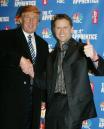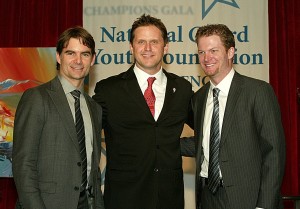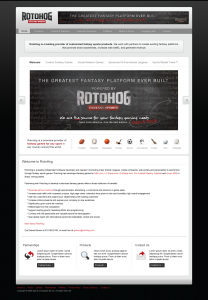Archive for the ‘Leadership’ Category
2009 UCLA Entrepreneurship Week Keynote
I was asked to deliver the keynote for UCLA’s Entrepreneurship Week. It was a lot of fun and some great questions from the entrepreneurs in the crowd!
Passion - You gotta have it!
What really turns you on? Think about it … what would cause you to jump out of bed every morning with a fire in your belly instead of dreading that train ride into “work?”
What would you do if you could do anything in the world? Now, get ready for this question…Why aren’t you doing it?
You can always come up with hundreds of reasons for not doing something. I challenge you to focus on the reasons you can do it. A lot people know that I’m a big planner. You need to have a plan. Planning may sound like the opposite of passion, but the reality is the most successful and happy people are actually able to combine the two! Lay out a plan that will enable you to get to a place where you can have passion for living. That should be your ultimate goal!
I’ve spoken in front of thousands of people from all walks of life. And I’ve asked them how they would know what they were really passionate about. There are always some common answers:
· It is something I would do if I had $10 million!
· It is something that I would not think of as work!
· It is that thing I’m doing when I lose track of time!
How do you know you’re really passionate about something? One clear indicator is your attitude. Your attitude is contagious. It infects those people around you in both your personal and business life. If you’re upbeat, excited and energized about a project, then that message will come through loud and clear. Whether it is your co-workers, boss, friends or family, they will pick up on your passion. Conversely, if you’re unsure, slow and not really into it, then that will be the message people get. That passion, will infect the people around you. The people that support you at home and people on your team at work. If they are as excited as you are, then they’ll work that much harder. So, if you’re passionate about what you’re doing, you’re much more likely to succeed at whatever you’re doing.
What makes you passionate? How do you define success? I think the most important part of those questions is YOU. Too many people spend their time trying to do what makes someone else happy. I urge you to figure it out for yourself and don’t let others define it for you. A lot of people allow others to set their goals for them. Do not let someone else define success for you. If you want to be a high school basketball coach and know that is something you’ll be passionate about, then go for it. If you really do want to be a real estate mogul and think that will make you happy, that should be your objective. However, your ideal job should drive you and keep you excited. Not because your mom or dad or neighbors think it is “success.” Remember, you’re the one that has to live your life — nobody else does.
I am an entrepreneur at heart and love starting and growing companies. Throughout my career, I’ve usually been able to help grow and develop one or two companies at a time as an operator. It has been incredibly rewarding. With RotoHog, I’m marrying up two of my passions – Fantasy Sports and Growing Companies! Talk about exciting! That is something that gets me out of bed every morning.
During my last year working with Donald Trump, a class of middle school students visited Trump Tower on a field trip and Donald agreed to come down and meet with them and asked me to come down as well. They asked us all sorts of questions, but one that I remember very well was, “Donald, what would you do for work if you didn’t do real estate?” And Donald answered, “I don’t consider what I do to be work. I love putting together deals and building buildings!” What a great answer! Can you say that about what you do? Donald only sleeps a few hours every night and doesn’t drink, smoke, or gamble. He loves his work. It is his passion.
Don’t get me wrong, I’m also a realist and understand that there are going to be times in our careers and life when we don’t get to do everything we want. It may feel like a “dead-end” job or you may see the writing on the wall and understand that you just don’t want to be a part of your current company anymore. What do you do about it? How do you handle that? What’s your attitude?
I recommend you take advantage of that situation to create better opportunities for your future. Do not sit around and mope. Do not have a bad attitude. Take that opportunity to teach yourself some new skills. Even if it is something simple like learning Excel and Power Point or attending trade association meetings in your desired industry, do something that will further your ultimate objective. Once you’ve figured out your long-term plan, it will be easy to determine what activities will help you the most in the future. Don’t waste time feeling sorry for yourself. Develop your plan with the objective of living that passionate life and start executing on that plan. Before you know it, you’ll be living that passionate life.
TAKE COMMAND!
Celebrity Apprentice 2 Starts Tonight!
Wow, hard to believe that was December of 2004 when I won Season 2. My year working with Donald in New York was great and I learned a lot. Now I’m running RotoHog, a fantasy sports gaming company and we build fantasy sports games for companies like NBA, Turner Digital, Pro Football Weekly, AVP, and Fox Espanol.
The Celebrity version is definitely a different type of show. It is fun to watch, but any sense of the results of the task and/or the Boardroom really impacting the individual contestants is missing. I think it is great that they are supporting charities and it is fun to watch the various stars try to lead their teams through the tasks. I wonder if they are ever going to be bring back the “old” version of the show?
Do you think they should?

2009 National Guard Youth Challenge Annual Gala
We raised almost $200K on the live auction and Dale Earnhardt, Jr. (right) and Jeff Gordon (left) were awesome! In addition to being phenomenal NASCAR drivers, they have huge hearts for charity! Check out www.NGYCP.org for more information on the charity. Thanks, Kelly

Kelly is the keynote kickoff speaker for Entrepreneurship Week at UCLA
UCLA Anderson School of Management is excited to celebrate Entrepreneurship Week on the UCLA campus for the second time. The events weave together high profile entrepreneurs from different field for a cross-campus pollination of ideas, discussion and collaboration. ALL EVENTS FREE EXCEPT TCA “Fast Pitch Competition” on 2.24.09 and Greater China Business Conference on 2.27.09. RSVP’S close the day of the event or when tickets sell out. Parking available in lot 4 for $9.
Planning
Fail to plan, plan to fail. It is as simple as that.
By plan I don’t mean have some idea in your head about your business or your career. I mean a REAL plan. A written plan…that you work on frequently. People always ask me how to get started on their plan and it is really quite simple. I like to use what’s called heuristic, or backward, planning that I learned in the military for my planning process. Basically, you start with your objective in mind then work back to where you are now. This type of planning process can be distilled down into three basic steps:
1. Identify your overall objective.
2. Determine the intermediate milestones and supporting tasks to reach each milestone.
3. Measure your performance and adjust your plan.
Let’s take a look at each of these three steps in the planning process…
Identify your overall objective.
Hopefully, you’ve incorporated your passion into your overall objective. That objective can be anything from getting a job in a new industry or at a specific new company to owning a major league sports team. Whatever it is just make sure it is something you’re passionate about and that it is defined. Once you’ve identified your overall objective, you can begin the processes of achieving it!
Determine intermediate milestones and supporting tasks to reach each milestone.
For any objective you identify, there will be many milestones. And for each milestone there will be many supporting tasks. For instance, if your objective is to find a job in a new industry, say real estate, then you’d have many potential milestones that could include: 1) obtaining some level of formal or informal education about real estate, 2) developing an understanding of the different jobs available, 3) conducting a self-assessment and comparing that to what you’ve learned about the industry to determine for which roles you’d be most suited, and 4) developing a structured network to assist you in finding, closing and excelling in your new job. These are just a few potential milestones, but based on your ultimate objective there can be many, many milestones and they need to be individually mapped out. For each of your milestones there are supporting tasks that must be accomplished. The more specific you are in identifying tasks and timing for them to be completed, the better you’ll be able to track your progress. .
Measure your performance and adjust your plan.
Tracking your progress is critical to success. You can’t know how you’re doing if you don’t measure against your plan. The milestones act as measuring point where you can assess your development and gauge your progress. As part of the process of measuring your progress you may find some interesting things occurring: You may learn that there are new milestones that you need to put in place to reach your objective; some of the milestones you thought you needed to reach your objective may not really be necessary; or you may even find out that you need to adjust your overall objective. Adjusting your plan is all part of the process and will ultimately enable you to achieve your objectives.
Planning is one of the most critical leadership principles that will contribute to your ultimate success in business and in life. Remember: identify your objective, set appropriate milestones and list their supporting tasks, and measure your performance so that you can adjust your plan as necessary.
TAKE COMMAND!
ProElite, Inc. DOES NOT tap out…
Congrats to Chuck Champion and the remaining team members at ProElite, Inc. who are still alive and kicking! Looks like King of the Cage is going to be their mainstay and that it is being operated profitably.
Great interview!
Check out ProElite.com. Most of my team here at RotoHog built that MMA community. Still looking good!
Launching B2B Beta Site for RotoHog.com

Re-branding for B2B
What do you think of the B2B look and feel? Should have the new site up for formal feedback in the next week.
I was asked today what are the most common errors made by first-time entrepreneurs and here is my list:
1. Financing. Don’t be undercapitalized. Raise more money that you need and spend like you didn’t raise enough.
2. Product. Don’t sacrifice time to market striving for perfection. This is obviously industry specific, but you should get something up asap and start getting feedback from your customers. A month in production and that feedback is worth more than a year in development.
3. People. Don’t scrimp on people. Get the best people involved.
a. Employees. Get people to work for equity (easier to do now than ever). Conserve as much cash as possible.
b. Advisors. Get an array of firepower in this section. Typically, the bigger the name, the less work they do.
c. Influencers. Befriend the influencers in the industry and make them part of your team. Co-opt them however you can.
4. Customers. You DO NOT know more than your customer. LISTEN always.
5. Plan and Measure. If you don’t have a plan that you’re measuring against, how do you know how well you’re doing? How do you know when to change direction? How do you even know which direction you’re going?
Let me know what you think!
Flexibility
The person with the most varied responses ultimately wins. This is true on the battlefield, in business and in life. I firmly believe this. There are all types of leaders and managers. How many managers have you had that can only address a problem one way? Some are shouters, some are planners and some are collaborators. But how many can be all three effectively in three different situations?
Any person who is inflexible - who can only operate in one manner - is not likely to survive very long. Problem-solving requires flexibility - and so does career planning. Very few jobs these days offer the security of knowing that you’ll be there for 20 or 30 years. In fact, the average time with a company for 20- and 30-year-olds is a little more than three-and-a-half years. Everyone needs to reinvent themselves, and leaving their comfort zone, and constantly, constantly learning. And in today’s economic environment, I’m sure the average time is getting even shorter.
How do you attack problems? Are you constantly seeking out new skills so that you can be more effective? Or are you satisfied with all that you think you know?
A lot of people are surprised when I say “flexibility” is a key leadership principle I learned in the military. Hollywood frequently portrays military personnel as rigid and inflexible. That is unfortunate and, in fact, nothing could be further from the truth. When an infantry unit is told by the commander to take a hill, they aren’t told how to take it. That is where the problem-solving comes in. The unit has to figure it out on its own. That problem-solving is something every ex-military person takes with them into the civilian workforce.
In June 2006, Korn/Ferry International - a premier global provider of executive, search outsourced recruiting and leadership development solutions - released the results of their study examining the performance of Fortune 500 companies led by CEOs with military background compared to those companies with CEOs without military experience. Companies led by CEOs with military experience have outperformed the S&P 500 Index over the past three-, five- and 10-year periods by as much as 20 percentage points. One of the six attributes listed as being the reason for their disproportionate success is the ability to solve problems in stressful conditions.
How do you handle co-workers that you can’t get along with? Or how about when you don’t get along with your boss? Do you blame it all on him or her? Or do you look at it as a challenge that you can overcome by being flexible? Try looking at those tough relationships the same way you look at a tough problem - they come in all shapes and sizes. How you handle them is up to you. One caveat in the regard, being flexible does not mean compromising your integrity. Always maintain your integrity.
In a May 2005, Fast Company article entitled “Change or Die,” editor Alan Deutchman described a great example of flexibility and how that leadership characteristic really can influence success. When Steve Jobs led the turnaround at Apple, Jobs returned to the company after having been gone for a long time and he focused almost exclusively on Apple’s flexibility and innovation. He recast Apple’s image among employees and customers from a second rate player defeated in its quest for a share of the market to the home of a small but highly enviable elite — the creative innovators who dared to “Think different.” Apple has been an innovator and focused on flexible thinking ever since and their stock has soared.
It is never too late to recreate yourself. Take the best attributes and skills you’ve got, identify where you want to be and what it takes to get there, set up your plan and go for it. For instance, if you’re currently in a very technical job, spend some time on marketing and sales skills. Understanding how marketing and sales perceives problems will help you deliver more effectively on the technical side. And, by developing your own sales and marketing skills you become infinitely more valuable to your company - or to a new company.
You can do the same thing in your position, no matter where you are. Don’t be the employee that always has the same solution for every problem. Don’t be the leader who approaches every employee the same way. Be fair, but be creative and understand that every employee and every problem is not identical.
TAKE COMMAND!
Kelly




